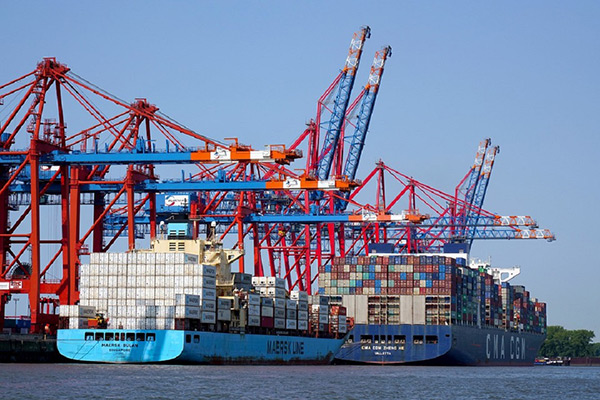Manufacturers that invest in supplier intelligence and the ability to make smart, fast decisions can thrive in disruptive business climates.

By Gregor Stühler, Co-founder and CEO, Scoutbee
Every day, manufacturers battle the supply chain impacts of inflation, supply shortages, natural disasters, port closures, and other disruptions. As these challenges continue to hit hard and fast, many are feeling the pressure to further build up their capabilities to respond swiftly and effectively and strengthen resilience.
McKinsey reports that supply chain disruptions cost the average organization 45% of one year’s profits over the course of a decade. As an economic downturn looms, which many CEOs expect not to be short lived, bolstering supply chain resilience can help control costs and deliver value that enable organizations to successfully navigate through tough times.
Build a high-performing and resilient supply chain by investing in your data and intelligence capabilities. Here are three ways strategic supplier intelligence can help manufacturers win the constant battle against disruptions.
Ask any experienced leader – in government, military, academia, or business – and they’ll likely say that having real-time, reliable, and actionable intelligence determines a mission’s success or failure. It’s incredibly difficult to win a battle or achieve any business objective if you’re making decisions based on best guesses or are taken off guard and are haphazardly reacting to the situation at hand.
Most manufacturers today, however, are going into their daily battles relying on their intuition. The data they’re using to make decisions is fragmented and unactionable, which often leads them to conduct post mortems after an event happens, instead of solving the issue in the moment.
Supplier intelligence drives agility and enables you to devise and execute an offensive strategy in real time. When the European gas crisis hit, few companies understood which of their suppliers relied on gas and what data they needed to figure that out and mitigate the impact.
Aided by the right intelligence, you can easily figure out which suppliers are impacted by disruptive events, quickly find alternate supply sources, and confidently decide whether to re-source risk categories from different suppliers that can meet demand.
Resilient supply chains aren’t born. They’re built, shaped, and refined. Over time, procurement teams identify their companies’ most important markets, categories, and suppliers that fulfill their business needs, and the riskiest suppliers or markets that make them more vulnerable.
The most fundamental step companies can take to strengthen supply chain resilience is to continually diversify their supplier base to reduce these vulnerabilities and avoid failures.
Supplier reliability can be unpredictable and can deteriorate in weeks or days. For example, in late 2021, many western manufacturers had reliable supply chain partners in Eastern Europe and Asia. But by 2022, many had discontinued sourcing from these regions following Russia’s expanded invasion of Ukraine, and ESG laws and regulations that made sourcing within China too risky for some.
Supplier intelligence helps you understand what your base looks like today and where to strategically redistribute your suppliers to reduce risk and the impact of disruptions. AI can look at who you are spending money with, the locations of your plants and warehouses, where your suppliers are shipping from, lead times, and more, and tell you who else could do the work for you somewhere else.
You can then nearshore and offshore as needed to avoid reliance on a single country or unpredictable players – and you can leverage the intelligence to architect this diversified supply base in a way that also meets your broader diversity and sustainability goals.
Perhaps shifting a portion of your supplier base to Mexico and Southeast Asia to reduce risk is the immediate priority, but you’re also looking to increase diverse-supplier spend by 20%, lower your carbon footprint, and reduce your overall number of supply partners. The beauty of strategic supplier intelligence is that you don’t have to put your broader goals on hold while you handle emergent issues.
Magic happens when you bring in and layer enriched data from a wide variety of sources – your ERP system, ESG scores, risk assessments, financial risk ratings, shipment data, diversity certifications, and more – to create a 360-degree view of your suppliers.
This visibility enables you to tackle today’s disruptions while putting you in a better position to handle whatever is on your priority list for tomorrow. When you’re looking at suppliers in Southeast Asia that will help you avoid risk in another part of the world, you’ll also know which of these partners can help drive your other objectives and then choose who you work with accordingly.
The combination of data is greater than the sum of its parts – and the value you drive for the organization is even bigger.
Data is a powerful tool for building resilience. No matter what situation hits you, if you have the right insights, you can navigate your way out of it before it causes negative and long-lasting impacts.
Some experts are predicting that 2023 will be even worse for worldwide supply chain disruptions than what we’ve seen over the past few years. The manufacturers that invest in supplier intelligence and their ability to make smart, fast decisions will be the ones that thrive in today’s ever-changing and disruptive business environment.

About the Author
Gregor Stühler is Co-founder and CEO of Scoutbee where he helps procurement teams make strategic and proactive decisions that strengthen supply chain resilience, improve sustainability, drive innovation, and reduce time to market.
Scoutbee is trusted by industry leaders in automotive, fast-moving consumer goods, energy and utilities, and off-road vehicles. Having won many prestigious awards (including Unilever’s 2022 “Partner with Purpose”) as well as important industry recognitions – 2022 ProcureTech100 company, Spend Matters 2022 “50 Providers to Watch”, and 2022 Gartner® Hype Cycle™ – Scoutbee is a recognized leader in AI-driven procurement technology.
Media Contact:
Corporate Ink for Scoutbee
Scoutbee@corporateink.com
www.scoutbee.com
617-969-9192
Scott Ellyson, CEO of East West Manufacturing, brings decades of global manufacturing and supply chain leadership to the conversation. In this episode, he shares practical insights on scaling operations, navigating complexity, and building resilient manufacturing networks in an increasingly connected world.